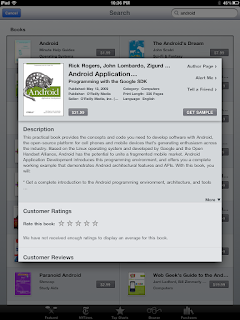
Apple's lock on the iTunes application store is legendary. In contrast to more "open" marketplaces that don't rely on centralized editorial control, iTunes applications are hand-reviewed by Apple employees, and the company controls what gets in and what gets out, what applications are featured, and can take weeks or even months to give your application the thumbs up. As the company's competition with Google and Android has escalated in the last year plus, we've heard stories of developers not being able to mention the alternative mobile OS in their products, and have seen those which are iPad-only getting significantly more play with Apple's marketing muscle. Today, headlines were made after one publisher's Android-centric magazine was blocked, not because of any rules infringement or legalities, but due to its content. The idea that Apple would start to police the subject matter of content in its store beyond its also-famous war on pornography, is eye opening and has many people wondering how much power the company intends to wield on the store. As of now, the ruling looks overreaching - and to be honest, it's also wildly inconsistent with existing content already available.
One major weakness for the iTunes review process is that it actually involves humans on both sides. That sounds silly, but it also gives Apple leeway if one rep overstepped his bounds, assuming that an Android-centric magazine would have no place on iTunes. It's easy to see a menacing Steve Jobs in the darkness pronouncing there is "one true phone" and that no others shall be mentioned, but it's just as likely it's a mistake. I hope it is, for the alternative is far more dramatic - one that spells an extremely unfriendly environment from a company that for the most part has its users fawning over its every move.
Curious to see how hard it was to find Android related content on iTunes, I looked around this evening, and while it's not easy to find, it's also not impossible, especially if you branch over to the iBooks section of the store.
Hey Look! A Magazine that Mentions Android on iTunes!
I even found a smartphone-centric magazine in the App Store that looks like it regularly features Android content and reviews. Smartphone Essentials Magazine uses Android as one of its keywords, and the application displays Android phones on some of its covers. If centering on Android is verboten, it looks like featuring it is just fine.
The iBooks section of the iTunes Store is overflowing with Android titles, highlighting Android apps marketing, Android application development and top apps on the Android platform for business, games and entertainment. There are books on free Android apps and wireless apps, reference apps and geeky guides. The simplest of these float for $2.99 apiece, while the developer tomes check in as high as $35.99.


Staying in the iBooks section, and flipping the search from Android to Google also doesn't show the impact of mass censorship and whiting out of competition one could expect if Apple had escalated the war of words to an unprecedented level. The bookshelf shows "What Would Google Do?", "Marketing in the age of Google", and many more titles on analytics, ads and SEO.

What Would Google Do? Not Censor, Probably.
In the Android market, which doesn't have the notorious human filters to it iTunes does, searching for iPhone doesn't come up empty either. There's O'Reilly Media's Missing Manual, iPhone themes to skin Android, and more. Don't let the fact that less than 50 people have downloaded the missing manual fool you, it's there, even if it isn't very popular.


Brutish bullheadedness on the part of Apple to try and force consumers, publishers and developers into a predefined world of what's acceptable and what's not fatigues my good will toward the company and the platform. The beauty of its apps, core OS and devices may be unmatched, but I fear they are on the brink of misusing their market position in a way that would raise fierce scrutiny if it was somebody else performing the evil deeds. The company should not expect its exclusionary behavior, if it is indeed true, to go unchecked, for even if it is not in a monopoly position, it is playing an unacceptable role with considerable market power. I cannot adhere to the belief that this company knows what is best for me and for all its customers every single time.
Apple and Google have an uncomfortable relationship now. Google's apps play a core role on the iPhone. Google search is the default engine on the iPhone and in Safari. But Apple is clearly threatened by Android and is squirming under the heat coming with the platform's market growth and feature creep that arguably brings it to near-parity in quality. That the iBooks section does not shy away from showing Android titles gives me hope that this ban is an exception to the rule and that we're not on a slippery slope that damages consumers and developers. Google would never remove Apple and Mac or iPhone results from their search engine, and the company helpfully offers Mac hardware to employees, and will keep doing so until some theoretical future where Chrome OS notebooks usurp that role.
As a businessperson, I get Apple doesn't want to help the enemy. I understand they are not a government entity, required to offer constitutionally-protected free speech. But I do not like the role they are playing as arbiters of morality and markets. The company has proven it can compete and do extremely well in offering high quality software and hardware in desktop and mobile, and should focus on marketing its own brand without its power to pretend alternatives exist.
Want to make customers forget about competition? Make something dramatically better and execute. None of this censorship garbage.

